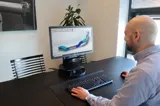
Simulation-Driven Development: Fast-Tracking Performance and Precision
Simulations are not only a way to accelerate development, reduce risk of failing prototypes and reduce testing time. It’s also a way to get the customer a very early understanding of the product that is being proposed for their application.




